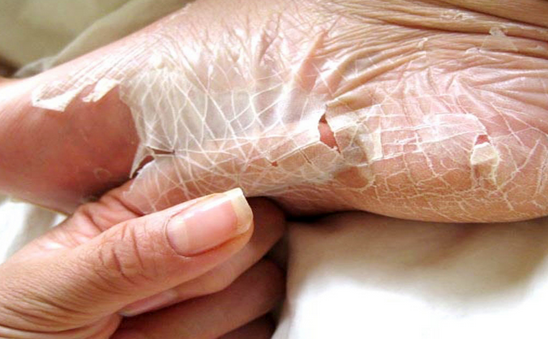Causes and symptoms of skin flaking

Because your outward appearance is a mirror of your inner health, we will review in the dermatology and venereal diseases everything you need to know about the health of skin, hair and skin, through a set of articles and news of health and medicine, to communicate to you reliable information in an attractive and simplified way and keep pace with the latest findings of modern science and medicine.
Acne treatment, which contains retinol, retinoid or benzoyl peroxide.
Chemical peels, such as face creams, are used to treat scar and wrinkles.
As a side effect of treatment: treatment and symptoms should be evaluated by a doctor. Among the treatments that cause skin peeling are:
- Radiation for cancer treatment.
- Chemotherapy reactions.
Allergic reasons: Various allergens, from food, animals, or environmental factors, may lead to peeling of the skin, such as:
↚
Causes and symptoms of skin
flaking
Eczema, causing white or yellow spots on the scaly skin.
Contact dermatitis, due to exposure to allergens such as perfumes, or irritants such as prolonged exposure to water.
Drug interactions, the symptoms of which may appear within days to weeks after taking the medicine, a condition that requires urgent medical care.
Immunological causes: autoimmune causes and autoimmune diseases may cause scaling of the skin, through:
Kawasaki disease, which usually affects children under five years of age, causes swelling and redness of the tongue, redness of the hands and feet, and swollen lymph nodes, which are cases that require urgent medical care.
Psoriasis, causes scales of scaly, silvery skin.
Infections: Scaling may result from inflammatory diseases, such as:
- Cochineal fever, caused by inflammation of the streptococcus bacteria.
- Scalded skin syndrome, which is caused by some strains of streptococcus.
- Ringworm, such as ringworm of the inner thighs, tinea capitis and tinea pedis.
- Toxic shock syndrome, it occurs due to the entry of staphylococcus aureus or streptococcus into the blood and the release of their toxins. The skin scales appear as a reaction of the immune system to toxins, and requires urgent medical care.
Other pathological causes:
↚
Causes and symptoms of skin flaking
- Fungal skin infections.
- Pemphigus.
- Exfoliative dermatitis.
- Hypervitamin A.
- Edema, swelling of the skin exfoliates it, and edema appears due to medical conditions such as heart failure or blood clots.
- Skin peeling syndrome, a rare genetic disease that appears with childbirth or later in childhood, and whose symptoms appear on the entire body or only hands and feet.
- Skin lymphoma T cells.
- skin cancer.
- Stephens Johnson syndrome, a skin disease caused by an allergic reaction or reaction.
- Desquamative epidermal tissue desquamation, caused by a drug interaction.
- Sunnite keratosis, which appears on the body's parts that are exposed to the sun a lot.
- Common thickness, which is an inherited or acquired condition characterized by the inability of the skin to exfoliate itself. The layers of skin cells accumulate in the form of fish scales.
- Stasis dermatitis, which appears in weakened blood supply to the body and causes swelling and blackness in the skin, and fluid from open wounds is filtered.
- Stasis ulcer, which is an advanced stage of stagnant dermatitis, causes pain and superficial wounds, and is slow to heal.
- Hypoparathyroidism, a rare condition that appears due to the inability of the parathyroid glands to secrete the parathyroid hormone. Symptoms include dry skin.
Skin scaling treatment
Treatment depends on the cause of the scaling of the skin and the severity of the symptoms. You should see a doctor and, based on the diagnosis, the cause and exfoliation is treated. In case of allergy, use of the irritant should be discontinued and see a specialist.

Comments
Post a Comment